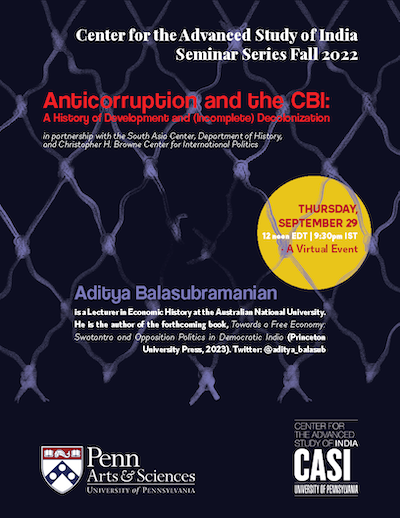Event
Anticorruption and the CBI: A History of Development and (Incomplete) Decolonization
Aditya Balasubramnian, Australian National University
 Despite its dubious constitutionality highlighted by the judiciary and calls for major reform that date to the 1960s, India’s Central Bureau of Investigation continues to operate as an appendage of the executive branch that loyally does the bidding of the government of the day. How did things get this way? This seminar examines the surprising transformation of a minor Special Police Staff created to deal with officials pilfering supplies and awarding fake contracts during World War II into the Central Bureau of Investigation, a body enjoying criminal investigative powers over the whole citizenry and across a vast range of offenses. The broadening of this institution’s ambit can only be explained in the context of the interplay of two competing logics articulated as such by the postcolonial theorist Sudipta Kaviraj. The first was the logic of bureaucracy, which saw the retention of colonial era laws and expansion of existing institutions to deal with the “emergencies” of decolonization, statist economic development among the most powerful. The second was the logic of democracy, and the increasingly vocal demands of accountability and discourses about corruption voiced by an enfranchised citizenry. As these logics competed, governmental rationality grew increasingly complex, sometimes more performative than substantive. Over time, the anticorruption apparatus itself became corrupted. Building on recent scholarship on decolonization, economic development, and corruption in South Asia, and making use of a vast range of sources, this seminar illuminates one of the paradoxes of the Indian present.
Despite its dubious constitutionality highlighted by the judiciary and calls for major reform that date to the 1960s, India’s Central Bureau of Investigation continues to operate as an appendage of the executive branch that loyally does the bidding of the government of the day. How did things get this way? This seminar examines the surprising transformation of a minor Special Police Staff created to deal with officials pilfering supplies and awarding fake contracts during World War II into the Central Bureau of Investigation, a body enjoying criminal investigative powers over the whole citizenry and across a vast range of offenses. The broadening of this institution’s ambit can only be explained in the context of the interplay of two competing logics articulated as such by the postcolonial theorist Sudipta Kaviraj. The first was the logic of bureaucracy, which saw the retention of colonial era laws and expansion of existing institutions to deal with the “emergencies” of decolonization, statist economic development among the most powerful. The second was the logic of democracy, and the increasingly vocal demands of accountability and discourses about corruption voiced by an enfranchised citizenry. As these logics competed, governmental rationality grew increasingly complex, sometimes more performative than substantive. Over time, the anticorruption apparatus itself became corrupted. Building on recent scholarship on decolonization, economic development, and corruption in South Asia, and making use of a vast range of sources, this seminar illuminates one of the paradoxes of the Indian present.
Co-sponsored with the Center for the Advanced Study of India
